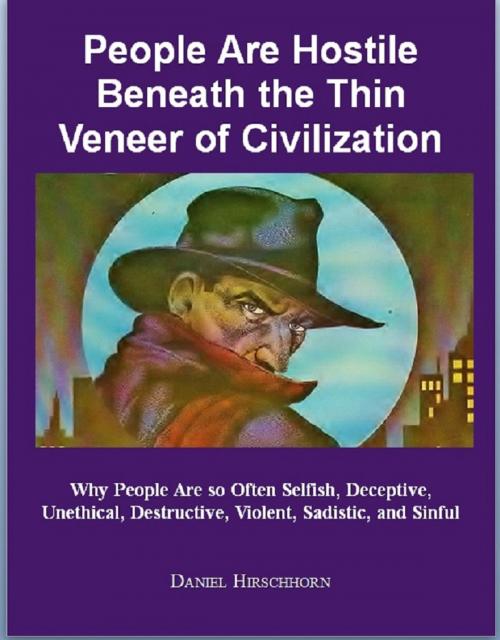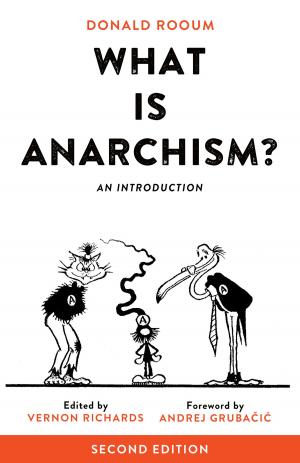People Are Hostile Beneath the Thin Veneer of Civilization
Why People Are so Often Selfish, Deceptive, Manipulative, Unethical, Destructive, Violent, Sadistic, and Sinful
Nonfiction, Health & Well Being, Psychology, Personality, Interpersonal Relations, Social & Cultural Studies, Political Science| Author: | Daniel Hirschhorn | ISBN: | 1230000500234 |
| Publisher: | TechWrite | Publication: | June 18, 2015 |
| Imprint: | Language: | English |
| Author: | Daniel Hirschhorn |
| ISBN: | 1230000500234 |
| Publisher: | TechWrite |
| Publication: | June 18, 2015 |
| Imprint: | |
| Language: | English |
Hostility is an innate, independent, instinctual disposition in people and a powerful obstacle to a civilized society. The historic and ongoing frequency of horrific crimes, wars, terrorism, and deplorable individual acts on a grand scale often make it feel like society is not prevailing very well over “evil doers” and their destructive deeds and drive toward chaos. The better we understand people’s thinking and behavior, the better we can understand their interactions with us. Of course, this quest for understanding has no easy answers.
Watching an hour of news today easily can remind us that many dreadful activities are occurring by the minute. It is easy to ask, what is wrong with people? What is the cause of the daily pain we experience from the nastiness, unfairness, lying, and cheating by so many around us, particularly in the workplace? Why is violence, slavery, and war still so prevalent in society?
Effective interpersonal relationships rely on cooperation and civility that flow from a significant measure of human conscience, character, morality, kindness, generosity, trust, principles—and love. Yet, many people treat others quite badly, often seemingly for no reason. Too often, we experience little kindness or ethical commitment from others. While people sometimes do act generously, kindly, and even heroically—routine meanness, over-aggressiveness, hostility, greed, and deceit are always evident among human relations in society.
The common venality of most people remains under various degree of control in relatively civilized societies. Civilization, a “system” of religion, government, and the rule of law, usually succeeds in curtailing exceptionally aggressive, violent human drives. Still, the magnitude of terrible behavior of various degrees remains prevalent in the world. The actual delight in aggression and wrongdoing that people experience is also evident.
Fully annotated and cited, this interdisciplinary study first recounts a series of terrible past and present hostile human actions and events and then explains the reasons why so many people are so often selfish, deceptive, manipulative, unethical, dishonest, destructive, sadistic, and violent. Through broadly researched sources, historic and new, information is presented and synthesized from the fields of history, law, religion, anthropology, psychology, literature, and more about people’s universal wrongful conduct.
All people are inherently aggressive, sometimes for good and useful reasons, but the facts and theories presented here strongly focus on the myriad actions and events people take and create to cause unwarranted, painful emotional and physical harm to others. The findings strongly indicate that most people are clearly disposed to routine over-aggression through various types and degrees of selfish, destructive, hostile, and violent thoughts and behaviors given certain circumstances. This behavior is a manifestation of our early ancestry, when our primitive ancestors had to be aggressive, had a hunting lifestyle, and clearly engaged in ongoing tribal warfare. In fact, we emerged from the most highly aggressive and intelligent primate the earth has ever known. Yet, our ancestors also knew how to form, maintain, and protect their own family and tribal unit! There certainly appears to be a dichotomy in all this.
Ultimately, at the most basic level, it may be that the main dispositional difference between people today is whether or not (or how much) they act out their built-in, overly aggressive, dark impulses. One could conclude that the difference between “normal” people and hostile, evil ones is that healthy people learn how and why to control their negative, hostile urges—possibly because no one wants to get caught and punished for misdeeds. Civil people manage to find smart, useful, or at least socially acceptable releases and outlets for their hostility. Dangerously destructive, hostile people “let themselves go” to do evil deeds.
For a deep understanding and proof of this reality, read my new book, People are Hostile Beneath the Thin Veneer of Civilization!
Hostility is an innate, independent, instinctual disposition in people and a powerful obstacle to a civilized society. The historic and ongoing frequency of horrific crimes, wars, terrorism, and deplorable individual acts on a grand scale often make it feel like society is not prevailing very well over “evil doers” and their destructive deeds and drive toward chaos. The better we understand people’s thinking and behavior, the better we can understand their interactions with us. Of course, this quest for understanding has no easy answers.
Watching an hour of news today easily can remind us that many dreadful activities are occurring by the minute. It is easy to ask, what is wrong with people? What is the cause of the daily pain we experience from the nastiness, unfairness, lying, and cheating by so many around us, particularly in the workplace? Why is violence, slavery, and war still so prevalent in society?
Effective interpersonal relationships rely on cooperation and civility that flow from a significant measure of human conscience, character, morality, kindness, generosity, trust, principles—and love. Yet, many people treat others quite badly, often seemingly for no reason. Too often, we experience little kindness or ethical commitment from others. While people sometimes do act generously, kindly, and even heroically—routine meanness, over-aggressiveness, hostility, greed, and deceit are always evident among human relations in society.
The common venality of most people remains under various degree of control in relatively civilized societies. Civilization, a “system” of religion, government, and the rule of law, usually succeeds in curtailing exceptionally aggressive, violent human drives. Still, the magnitude of terrible behavior of various degrees remains prevalent in the world. The actual delight in aggression and wrongdoing that people experience is also evident.
Fully annotated and cited, this interdisciplinary study first recounts a series of terrible past and present hostile human actions and events and then explains the reasons why so many people are so often selfish, deceptive, manipulative, unethical, dishonest, destructive, sadistic, and violent. Through broadly researched sources, historic and new, information is presented and synthesized from the fields of history, law, religion, anthropology, psychology, literature, and more about people’s universal wrongful conduct.
All people are inherently aggressive, sometimes for good and useful reasons, but the facts and theories presented here strongly focus on the myriad actions and events people take and create to cause unwarranted, painful emotional and physical harm to others. The findings strongly indicate that most people are clearly disposed to routine over-aggression through various types and degrees of selfish, destructive, hostile, and violent thoughts and behaviors given certain circumstances. This behavior is a manifestation of our early ancestry, when our primitive ancestors had to be aggressive, had a hunting lifestyle, and clearly engaged in ongoing tribal warfare. In fact, we emerged from the most highly aggressive and intelligent primate the earth has ever known. Yet, our ancestors also knew how to form, maintain, and protect their own family and tribal unit! There certainly appears to be a dichotomy in all this.
Ultimately, at the most basic level, it may be that the main dispositional difference between people today is whether or not (or how much) they act out their built-in, overly aggressive, dark impulses. One could conclude that the difference between “normal” people and hostile, evil ones is that healthy people learn how and why to control their negative, hostile urges—possibly because no one wants to get caught and punished for misdeeds. Civil people manage to find smart, useful, or at least socially acceptable releases and outlets for their hostility. Dangerously destructive, hostile people “let themselves go” to do evil deeds.
For a deep understanding and proof of this reality, read my new book, People are Hostile Beneath the Thin Veneer of Civilization!















